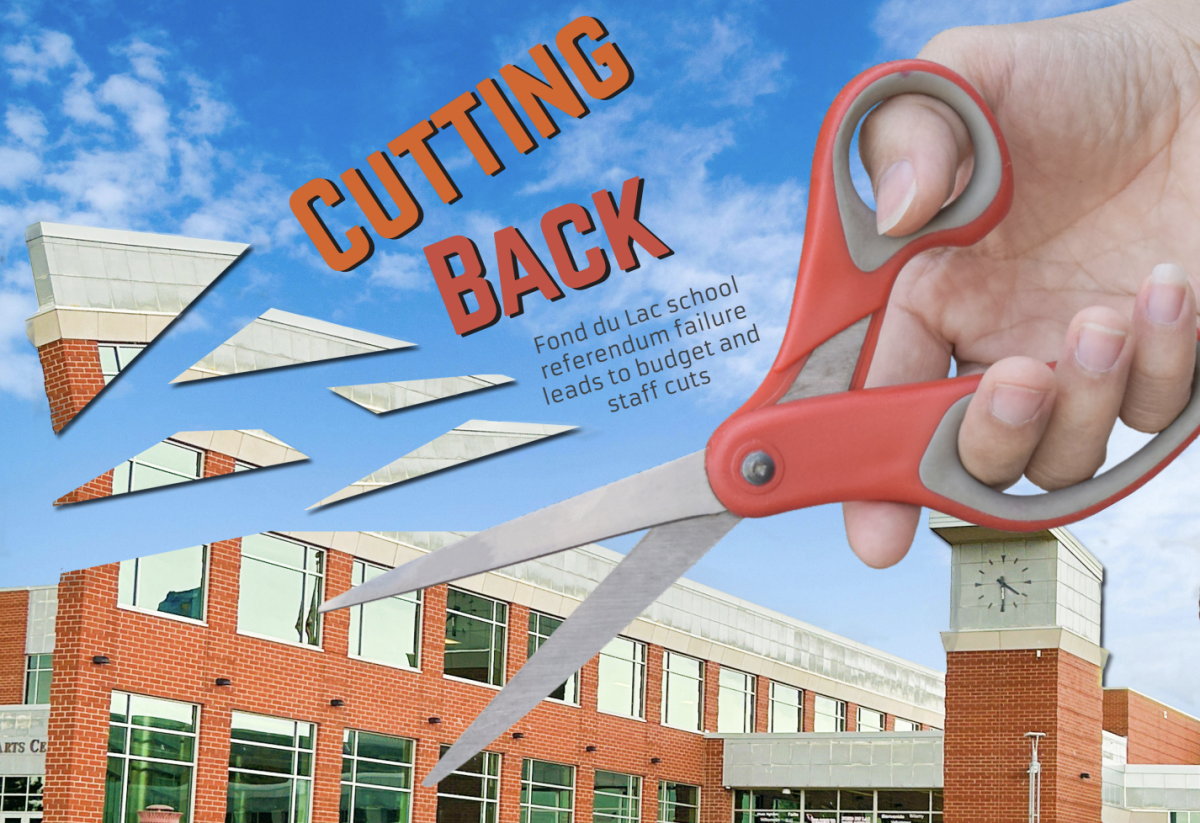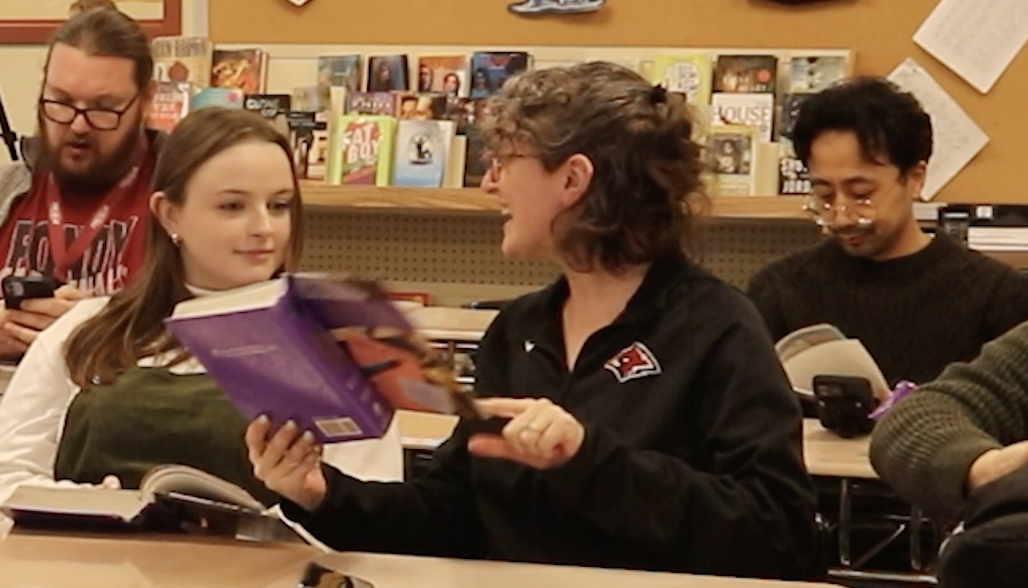Senior Hannah Guyette is deeply concerned about teachers in the district after the referendum failure. As a student and a TA at the high school, she has a direct view into the way budget cuts are affecting teachers. “Teachers are more stressed out,” she said, “I mean, I’ve seen teachers who I won’t name cry about it.”
On April 1, Fond du Lac County voters rejected a referendum put forward by the school district asking for $40,000,000 from property taxes over four years. This would have been used to keep up with staff and maintenance costs and to introduce new upgrades to security. Its failure has resulted in a tumultuous time for the district as 83 positions have been cut, including many teachers, and hearings have been held with little to no information provided, according to teachers involved.
Although no polling among voters was done, many in the district, including teachers and students, say the rejection was due to misconceptions and a lack of knowledge surrounding the school district’s funding and operations.
What is it?
Due to state funding laws and regulations going back to the 1990s, Fond du Lac School District can’t maintain current operations next school year without increasing property taxes within the district. State law doesn’t allow this without voter approval, which failed through the referendum.
In 1993, Wisconsin Act 16 instituted school revenue limits. Fond du Lac School District was a low-spending district, and was capped at a lower per-pupil amount. Later, the 2009-2011 Wisconsin State Budget Act deleted the allowed inflation adjustment to revenue limits. At this time the per-pupil revenue amount is more than 15 years behind the consumer price index inflation rate. This means the money the school gets has not increased along with other prices.
“This is a state issue, not just a Fond du Lac issue,” said Nicole Hawkins, an art teacher at Fond du Lac High School. “I don’t know how much the district contributed to growing our deficit, but we would have gotten here either way.” Hawkins also explained that state aid from COVID postponed fund shortages across the state four years ago, running out at the end of 2024.
Without more state funding, the district would have a budget shortfall of $7-9 million per year for the next four years. The referendum asked that voters authorize the district to “exceed the revenue limit by $10,000,000 per year for four years.” This would maintain staff, class sizes and current expenses, cover maintenance expenses, allow for security updates and increase special education funding according to the district.
This new revenue would have come from property taxes. According to the Fond du Lac School District website, property taxes for a $100,000 property would increase by $7.67 per month for the first year, decreasing to $1.92 for the fourth year.
Referendum results
A total of 89 separate school district referendums were proposed and voted on in Wisconsin in the April 1 election. Voters approved approximately 55% of these referendums, with the larger districts typically being turned down. This was reflected in Fond du Lac’s proposal failing. The unofficial results showed 9,617 votes against exceeding the district’s revenue limit, and 8,452 votes in favor of it.
“Every citizen in our community makes the voting decision that makes the most sense to them,” school board member Katie Moder said, “Many different factors influence how voters make their decisions, including how we are currently serving our community, how our students continue to make academic gains as well as state and federal decisions that affect taxes and the cost of living.” The results are a reflection of what voters within the Fond du Lac community knew at that time and what their opinions were on the district. However, several community members and FHS students have made it clear that they don’t think voters knew what actual deficits would occur when the referendum didn’t pass.
“How can you make decisions on behalf of our community when the community only has a vague idea of what might be proposed tonight?” Tiffany Brault said at the board meeting following the referendum when the board was set to decide how to handle the fallout. As current president of the city council and wife of Andrew Brault, a teacher affected by budget cuts, she spoke to the board on the referendum. “I’ve heard so many rumors just in the past couple of weeks of who or what might be cut, how are you expecting to make a decision on behalf of your constituents when we have been left in the dark and cannot give any real feedback on any specifics?” Brault emphasizes that the Fond du Lac community wasn’t properly informed, while other students, staff and others have made their opinions on the failed referendum known in interviews with the Cardinal Columns.
“Maybe if the community would have known more, and I’m sure if parents knew that teachers would have been cut, it probably would have passed,” Guyette said. “They don’t tell us anything. Be more clear. It’s not that difficult. Be mature. Tell us what you’re doing.”
In a survey sent to FHS students by the Cardinal Columns, respondents commented that, “I was against it because the money they were taking from taxes was too much and I was concerned I would not be getting all the money I work for everyday,” and, “I didn’t pay attention to the referendum. I just want our school to improve but I also understand why people don’t want to pay that much money. In addition, we just got a referendum so it does seem a bit desperate.”
What happens now?
The largest impact of the referendum failure are drastic staffing cuts. On April 14 the Board of Education voted to cut 83 positions. Staff cuts, according to the school’s Chief of Finance and Operations, Michael Gerlach, are “the only way to make up a deficit this large.” A point system was used to determine these cuts. The vast majority of it was based on district leadership activities, with points taken off for potential behavior and performance issues, points added for hard-to-hire certifications, and points added for evaluation scores.
Newly elected members of the school board were sworn in on Monday, April 28, after decisions on teacher layoffs for the 2025-26 school year had already been made. In a May 1 Radio Plus interview, they expressed their opposition to the layoffs. New board member Luke Frame believes there are alternatives to laying off teachers. “We’re going to need to get creative,” he said.
“The administrators recognize and take seriously the fact that teachers are losing their jobs as a result of these actions,” said Steve Kruzel, the attorney for the Fond du Lac Board of Education. “However, such results were clearly contemplated by the no vote to the referendum.”
Superintendent Jeffrey Fleig resigns June 30, one day before the next fiscal year.
The Fond du Lac Education Association argues the previous board rushed this decision, claiming the district had an April 30 deadline to file those preliminary notices, not allowing adequate time to prepare for the appeal hearings.
At these hearings, students and community members were invited to speak, given three days of preparation, to plead the cases of staff member layoffs. “Every time our side spoke, there was clapping. Everyone that was in there was clapping,” Guyette said while debriefing her experience from one of the hearings. “And every time they [the school board] spoke, silence, nothing, zero, no clapping for them. Because how are you going to cut teachers and not tell them exactly what happened until the meeting?”
“Our community deserves answers as to why these appeals have been rushed to this degree,” Megyn Stroup, the vice president of the Fond du Lac Education Association, said.
Many teachers also believe the hearings were rushed, saying they were not allowed adequate time to prepare or given the information necessary to properly advocate for themselves. “I was given three days, and I had a lot more to say. I could have dug up more information. I could have presented my case maybe differently or better,” said one teacher, whose name has been withheld for their protection. “I would have liked to have seen the criteria I was being judged on prior.”
Staffing cuts will result in increased class sizes at the middle and high schools as well as a change in scheduling causing increased teacher loads. The middle schools will switch to a six period day, with teachers teaching five periods rather than three. At the high school teachers will switch from teaching at least five periods a day to at least six.
Looking to the future, changes will continue to be made in order to continue giving students the best education that can be offered. “The team in this department [Pupil Services] and others wrote for grants that helped with funding specific programs. It will be important to continue seeking such opportunities while closely monitoring our spending. What do we need versus what do we want, always keeping student success in mind?” Moder said.











